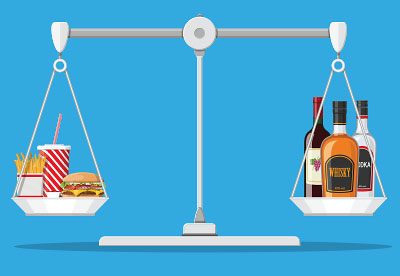Weight Loss Surgery Increases Risk of Unhealthy Drinking
Abstract
More needs to be done to educate candidates for bariatric surgery that drinking behaviors may change after surgery and to track their behaviors long term, experts say.

Bariatric surgery is a proven approach to promote weight loss and can be a potentially life-saving procedure for people who are severely obese. However, there are important but underappreciated side effects of bariatric surgery, including an increased risk of alcohol misuse.
A study appearing in JAMA Network Open detailed these risks. Investigators found that adults who had no history of unhealthy alcohol use prior to bariatric surgery were about twice as likely to develop unhealthy alcohol use after surgery compared with overweight adults who did not receive surgery.
“The clinical implications of these results suggest that patients undergoing bariatric surgical procedures should be cautioned that drinking alcohol can escalate after bariatric surgery, even in patients with no previous evidence of drinking alcohol above recommended limits,” wrote lead author Matthew Maciejewski, Ph.D., director of the Health Economics and Policy Unit at the Durham VA Medical Center, and colleagues. “Furthermore, all patients who undergo bariatric surgical procedures should be monitored long-term for unhealthy alcohol use.”
Previous research from Sweden had identified a relationship between bariatric surgery and unhealthy drinking behaviors, but those studies only examined Roux-en-Y gastric bypass (RYGB) surgery. Though RYGB surgery—which connects the esophagus and small intestine via a small gastric pouch—has long been considered the gold standard for weight loss, laparoscopic sleeve gastrectomy (LSG)—in which a portion of the stomach is excised—has become more popular in the United States, as it is a simpler and less invasive procedure. Additionally, most trials examining drinking behaviors following bariatric surgery were conducted in women. Though women are more likely than men to undergo bariatric surgery, men have higher rates of alcohol misuse and alcohol use disorder.
Maciejewski and colleagues analyzed electronic health record data of 2,608 veterans (75% male) who underwent a bariatric surgical procedure between October 1, 2008, and September 30, 2016. This sample included 1,684 patients who received LSG and 924 who received RYGB surgery. Another 22,284 veterans who had not had bariatric surgery but had similar body mass index and other characteristics as the patients who did were included as matched controls.
Since 2004, the U.S. Department of Veterans Affairs has required screening of all VA outpatients using the three-item Alcohol Use Disorders Identification Test-Consumption (AUDIT-C). The researchers divided the study participants into groups based on their AUDIT-C scores. Any female veterans who scored ≥3 or male veterans who scored ≥4 in the two years prior to surgery were classified as having unhealthy alcohol use.
About 92% of the participants had no history of unhealthy alcohol use. The researchers then evaluated alcohol use trends in all patients and controls for up to eight years after the surgery (or matched date for a control).
They estimated that among veterans without a history of unhealthy alcohol use, 7.9% and 9.2% were at risk of developing unhealthy alcohol use eight years following their LSG or RYGB surgery, respectively, compared with 4.5% and 4.4% of matched controls in the same timeframe.
Among veterans with a history of unhealthy alcohol use, 39.4% of veterans who received RYGB were at risk of postsurgical unhealthy alcohol use, compared with 25.7% of matched controls. The researchers identified no differences in unhealthy alcohol use risk between veterans with a history of unhealthy alcohol use who received LSG and matched controls (26.1% versus 28.9%, respectively).
Maciejewski and colleagues noted that the higher rates of unhealthy alcohol use among veterans after RYGB might reflect metabolic differences between procedures. Studies have indicated that blood alcohol levels increase faster and peak higher in people who receive RYGB surgery versus LSG.
Anne Fernandez, Ph.D., an assistant professor of psychiatry at the University of Michigan, noted that behaviors such as physical inactivity, poor diet, and drinking contribute to both obesity and alcohol use disorder. “Thus, bariatric surgical procedures represent a crossroad whereby a subset of patients transitions from one pervasive and high-risk behavior to another,” she wrote in a related editorial.
Fernandez added that the AUDIT-C data showed many surgical recipients decreased their drinking in the months before their surgical date—which may result in standard preoperative questionnaires failing to capture a patient’s full risk profile. The findings by Maciejewski and colleagues “warrant a more strident effort to improve preoperative alcohol education, counseling, and problem prevention,” she wrote.
“Multidisciplinary teams should provide universal alcohol education and prevention messaging for patients before the surgical procedure, regardless of past alcohol use. Clear evidence of unhealthy alcohol use should lead to brief intervention and/or treatment referral and may also negate surgical candidacy depending on the severity of the problem,” she added.
This study was funded by grants from the National Institute on Drug Abuse and Durham VA Health Care System, with additional support from the U.S. Department of Veterans Affairs and American College of Surgeons. ■



